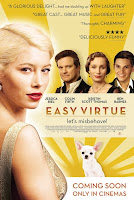
Director: David Fincher
Year: 2008
Short story by: F. Scott Fitzgerald
Adapted by: Eric Roth, Robin Swicord
Cinematographer: Claudio Miranda
The script is aweful. The effects are creepy, as an old man, Pitt simply uses his voice like a simple script reading in an imitation of innocent youth. Pitt's acting is not very good here, but its not helped by the script, which is redundant enough to show exactly what Benjamin is writing in his diary. The frame of the story with the hurricane in New Orleans is forced and useless, the acting is very poor in certain parts, and I'm inclined to give fault to Fincher for bad directing. For example, in the scene where his father robs him from the cradle, his arm flails while running as if to push people away, the physical acting is too big, also when Blanchett's daughter says something like "boy it sure is getting bad out there" its kind of a duh moment, a giant hurricane is coming, and the story all of a sudden pulls out of the diary reading in order to show a lightning strike and this forced moment, and on top of that, her arms are stretched out and down in shock at the lightning, and it just annoys me because its so over acted, but then again, the script is dumbed down.
Don't ever explain things so plainly, like when the doctor at the beginning lists off Benjamin's symptoms, and if that wasn't clear enough, says "more like an old man than a new born child"... well duh! We knew that from the trailer and plot synopsis, we don't need it spelled out for us. oh, and just because a character is from the south does not mean that the only punctuation added to a sentence should be "ya here!" People from the south may use this, but its not the only punctuation added, nor do they always add a punctuation to their sentences. This is cheap screenwriting, the dialogue is atrocious, and again, if you are going to have voice over, it must be giving the audience some kind of extra insight that we can't glean from the images themselves.
What's with the 7 lightning strike inserts?
Pitt's accent here is the only thing worse than the script.
Every single time the film returns to present day in the hospital, someone has to make a stupid reminder of "the hurricane's a'commin'!"
Another choice that annoys me, is that the intro has this old film affect added in digital post, its cheap, it looks like a bad effect and you can tell that the film wasn't shot that way, for one thing, old 8mm film wasn't widescreen, and for another, it breaks the effect when you use it on a crane shot. If you want the effect of the old 8mm hand-held cameras, well then why don't you use an old 8mm camera hand-held, and put the footage in the film as the separate format?
Bad effects choices here, oh, and Benjamin looks creepy, you are always aware that its a CGI character.
Do not waste your time on this film, I can't believe it was nominated for oscars for directing and screenplay, this has got to be one of the worst screenplays to ever be nominated, and this is 2008's most overrated film.
Forrest Gump is a much better choice if you want to see american pop culture history told through the lense of one outstanding character.

















































